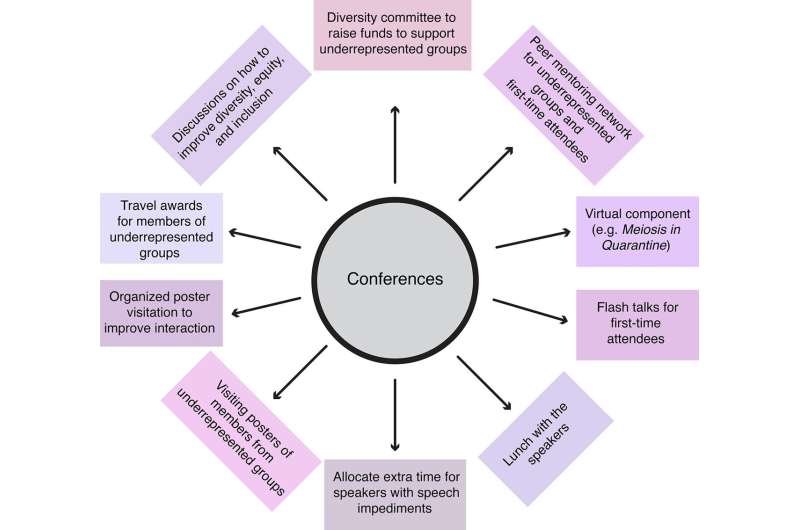
During the ongoing COVID-19 pandemic, a group of geneticists who study the cellular process of meiosis held a virtual discussion of how to boost inclusion of underrepresented groups in their community. Now, Katherine Billmyre of the Stowers Institute for Medical Research, María Angélica Bravo Núñez of Harvard University, Francesca Cole of the University of Texas MD Anderson Cancer Center, and colleagues outline the resulting action plan in an opinion piece for the open-access journal PLOS Genetics.
The researchers’ definition of underrepresented groups is broad, but includes underrepresented gender, racial, or ethnic groups, as well as people who have disabilities or are neurodiverse, part of the LGBTQ+ community, from disadvantaged backgrounds, or first-generation college students. As discussed in the webinar, “Meiosis in Quarantine,” individuals from these groups face lack of representation and numerous other challenges in academia.
The first part of the plan focuses on boosting diversity and inclusivity at academic conferences. Action items include diversifying the lists of people invited to speak, providing innovative and inclusive networking opportunities, and addressing barriers that prevent in-person attendance—for instance, by providing financial assistance for travel or including a virtual conference component.
The action plan also outlines steps to increase diversity and equity outside of conferences. In particular, it addresses a lack of representation among leaders in genetics research, which can discourage pursuit of academia by trainees from underrepresented groups. To resolve this issue, the plan includes calls for encouraging interest in STEM fields from kindergarten through undergraduate education, removing obstacles that prevent diverse individuals from entering graduate school, improving the internal culture of research labs, and addressing inequality in faculty hiring.
The authors acknowledge that the issues addressed by their action plan extend far beyond the genetics community and call for extensive institutional reforms. These include better retention of diverse faculty and better benefits for postdoctoral researchers who are also caregivers in their families.
The authors hope the action plan will improve diversity, inclusivity, and equity in post-pandemic conferences and beyond, both in genetics and in other scientific fields. Not only do they believe that fair treatment is a moral duty, but it is widely accepted that a diverse scientific community helps fuel discovery and innovation.
Source: Read Full Article
